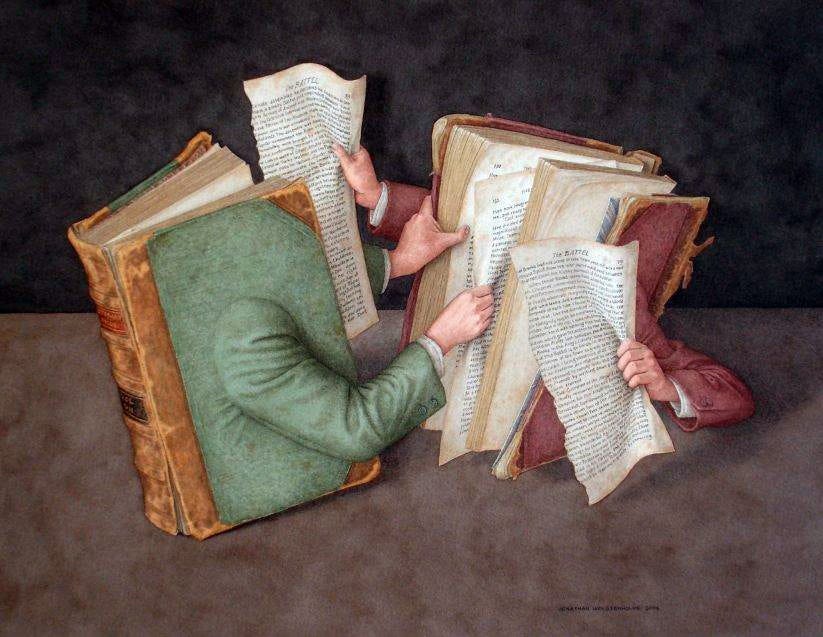Why I Stopped Using Goodreads
Goodreads: Good in the Short-Term & Bad in the Long-Term
When people get into reading one rite of passage seems to be signing up to Goodreads. Although Goodreads is a platform for readers, I don’t believe that it benefits all readers equally. When it comes to reading non-fiction, I believe that Goodreads can be helpful at the start of one’s reading journey, but it can become an obstacle later on.
When you get into reading it can be easy to fall into the trap of thinking that “the more books you read, the more knowledge you will gain, the smarter you become.”“The more the merrier” attitude is common, especially online. YouTube videos with titles like, “I read 52 books in 2023.” Posts of people bragging about how many books they’ve read. You see this mentality everywhere and I believe Goodreads plays a role in reinforcing it. Goodreads will prompt you to set a reading challenge. Most of the other Goodreads users you will encounter will be those who have written the top 10 reviews for books. Most of them have read multiple 100s of books, leading to upward social comparisons.1
In the beginning when you finally start to read after years of having been told that reading is the number one habit for success, you feel like you have to catch up. So you think you need to speed read to obtain the knowledge faster. Although counterproductive in the long-term, I do think this mentality can be helpful in the beginning for two reasons.
It will motivate you to continue reading. It’ll make you excited for the next book. But at some stage you realise that you’re not actually excited about reading books but rather you are excited about finishing books. During my peak Goodreads phase, the first thing I did after finishing a book was marking it as “read.”
You quickly figure out what you like and dislike. I found this difficult in the start so I just ended up reading whatever I felt like I should read. By going through a lot of mediocre books and some good and bad books you quickly figure out what you’re actually interested in. It helps you overcome beliefs like, “I should be reading book X because I am person Y.” Nowadays, I don’t even bother with particular bookstores because I know they don’t sell what I’m interested in.
However, rushing through books comes with several downsides. You’re reading books to finish them, not necessarily to understand them. You want to start the next book as soon as you have finished the last one. You will not bother to read thick books because you might as well read two or three short books instead because that will pump up your numbers. And you will be way less inclined to reread books.
Aside from incentivising reading as many books as possible, Goodreads can also easily become a distraction. Expanding on your never-ending to-read list can feel productive, but it’s sort of like watching workout videos and reading up on fitness tips without ever exercising. It feels productive, but it’s distracting you from what you are actually trying to do. This is something I am very familiar with. At some stage I spent more time a day on Goodreads searching for the next book to read than actually reading.
When it comes to the benefits of Goodreads I hear lots of people say that they use it to keep track of what they’ve read and to find new books. I believe that for these two purposes there are better options.
Keeping track of what you’ve read or want to read: An excel spreadsheet or a piece of paper.
Finding new books: I don’t think that Goodreads is that good for finding new books. Out of the great books I ended up reading very little of them I found through Goodreads. In my opinion Goodreads’ strength is having a catalogue of millions of books. So when I find a book I might want to read, I’ll look it up on Goodreads and then see if I am actually interested in it. But the books that Goodreads recommends feel stale and repetitive. When it comes to finding new books I feel like the following methods are better:
Getting book recommendations from people who you click with, whether those people are celebrities or people you know.
Looking up books that were mentioned in books you like.
Check out specific book lists online. For example, “Books to read in your 20s.”
Similarly to the last point, get book recommendations from “experts.” For example, if you want to learn more about X you might as well get recommendations from someone that has read a lot of X.
If you found a book you like you can ask ChatGPT to recommend similar books.
I personally find Storygraph (a Goodreads alternative) better for finding new books without some of the downsides of Goodreads.
https://en.wikipedia.org/wiki/Social_comparison_theory



I thought people used Goodreads as a glorified Excel spreadsheet, but I realize I’m probably projecting :)